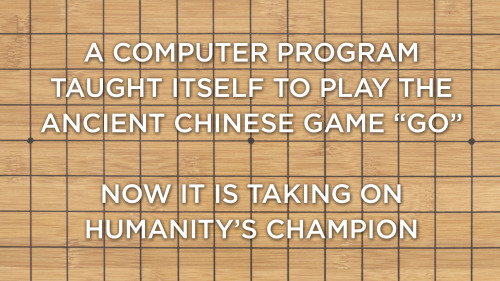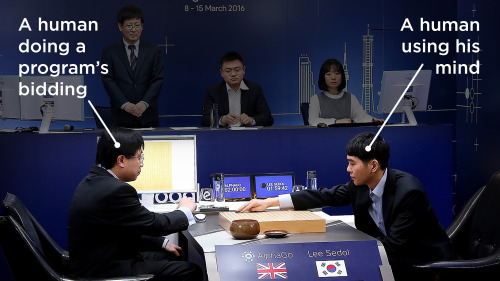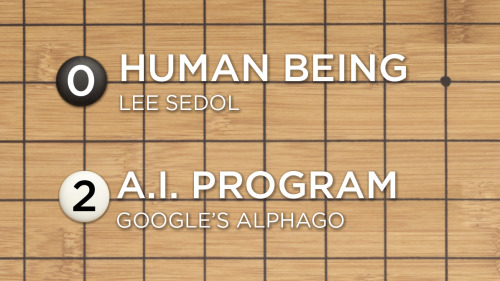hextrudedcubes:pyrrhiccomedy:skunkbear:A computer beat a human in chess 20 years ago. But chess is r
hextrudedcubes:pyrrhiccomedy:skunkbear:A computer beat a human in chess 20 years ago. But chess is relatively simple. The ancient Chinese game of Go is thought to be the most complex game ever created.“There are more possible ‘Go’ positions than there are atoms in the Universe,” says Demis Hassabis. He works at Google DeepMind, the search engine’s artificial intelligence company. Hassabis and his teammates built a program called AlphaGo that could learn to play the game. It studied 100,000 human matches, and then played millions more against itself.Now that program is being put the test in a series of five matches against Go champion Lee Sedol.The first match lasted 3 hours and 33 minutes. Sedol lost. You can watch it here. The second match lasted 4 hours and 22 minutes. Sedol lost again. You can watch that too.The losses came as a surprise. Though AlphaGo has already beaten lower ranked Go players, experts predicted it would be another decade before artificial intelligence could beat a Go champion. If Sedol loses his next game (scheduled for Saturday), he’ll have lost the series. Read more about why this is such a big deal (and how this AI could be useful for more than humiliating humanity) here.HO-LY SHIT. You guys need to understand how HUGE this is. Go was the last game where computers couldn’t beat even a talented amateur, and we thought it would be DECADES before that changed–if ever. Go can’t be broken like chess: there are so many possible positions and moves that brute force calculation gets you nowhere. It’s also impossible to objectively measure the value of the material on the board. In chess, each piece has a certain numerical value. In Go, every stone has the same value as every other stone, and advantage is conferred not necessarily by how many stones you have on the board, but on their relative positions. Even 9-dan Go players (the equivalent of a chess grand master) often have difficulty explaining how they know a move is the right one, or even how they can tell who is winning. Described by experts as “infinitely more subtle than chess,” Go was the last great barrier to machine domination because it is profoundly and inescapably intuitive.The other reason this is so wild is because NOBODY’S HEARD OF THIS PROGRAM BEFORE? I’ve been following the development of Go programs for about five years. The frontrunners - Zen, Crazy Stone, one or two others - have been tested and competed against one another and slowly tweaked and refined for years. If you’re interested in this story, you’ve heard of them. But the Google program dropped out of nowhere. Guys, this is like when Beyonce dropped an album without telling anybody. For computer nerds and watchers of AI development, this is that exciting.Wow. Wow. Wow. Holy shit.I was also astonished to find out that computers could finally beat Go masters. I was almost surprised that the program was Deep Mind-based, until I remembered. They are not teaching computers to “dream”. They are not teaching computers to play games.They are teaching computers to learn.And, to paraphrase the great Bill Nye Tho, if you don’t think that’s the most exhilarating, terrifying, wonderful thing, then get out of my face. -- source link
Tumblr Blog : skunkbear.tumblr.com
#go#boardgames#technology#interesting




